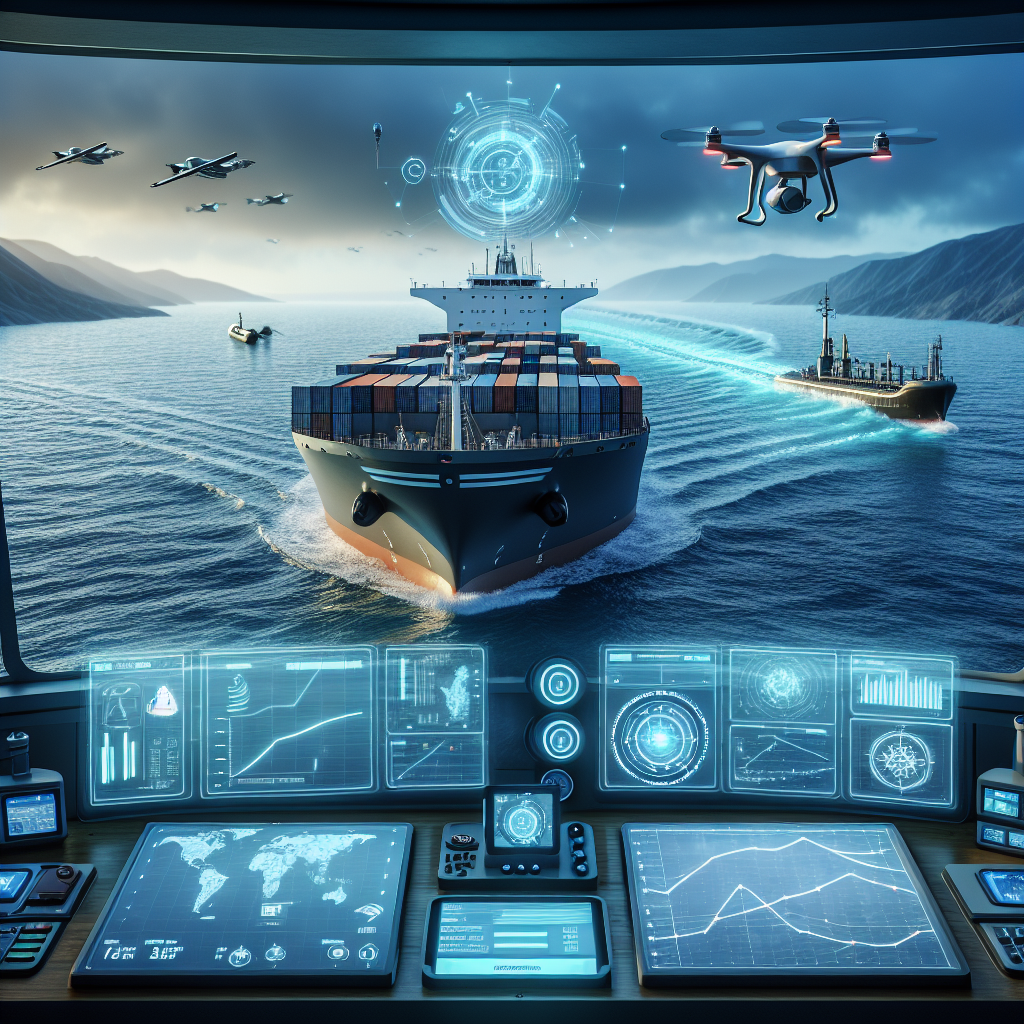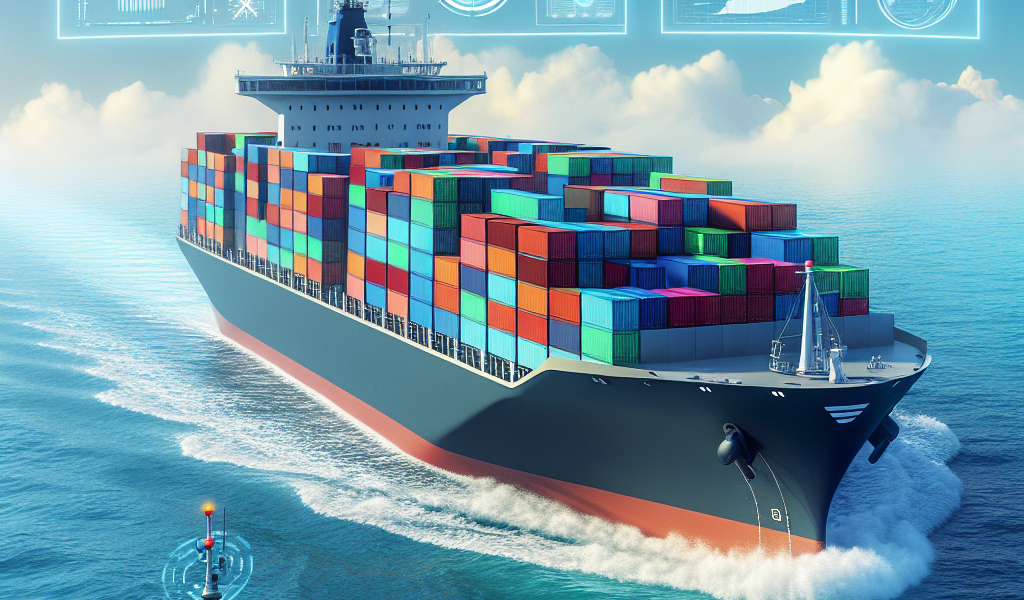-
Table of Contents
“Navigating the Future: Unleashing the Potential of Autonomous Shipping”
Introduction

Autonomous shipping represents a transformative leap in maritime technology, promising to revolutionize the global shipping industry. By leveraging advanced technologies such as artificial intelligence, machine learning, and sophisticated sensor systems, autonomous ships are designed to operate with minimal human intervention. This innovation offers a multitude of benefits, including enhanced safety, increased efficiency, and significant cost savings. Autonomous vessels can navigate more precisely, optimize routes in real-time, and reduce the risk of human error, which is a leading cause of maritime accidents. Additionally, the reduction in crew requirements can lower operational costs and improve working conditions by minimizing the need for long periods at sea. As the industry continues to evolve, the integration of autonomous systems is poised to address some of the most pressing challenges in maritime logistics, paving the way for a more sustainable and resilient future in global trade.
Enhancing Efficiency and Reducing Costs in Maritime Transport
Autonomous shipping is rapidly emerging as a transformative force in the maritime industry, promising to enhance efficiency and reduce costs in ways previously unimaginable. As the global economy becomes increasingly interconnected, the demand for more efficient and cost-effective shipping solutions has never been higher. Autonomous ships, equipped with advanced technologies such as artificial intelligence, machine learning, and sophisticated sensors, are poised to meet this demand by revolutionizing the way goods are transported across the world’s oceans.
One of the most significant benefits of autonomous shipping is the potential for increased efficiency. Traditional shipping methods often involve complex logistics and human error, which can lead to delays and increased operational costs. Autonomous ships, on the other hand, can operate around the clock without the need for rest, thereby maximizing productivity. These vessels are capable of making real-time decisions based on data collected from their surroundings, allowing them to optimize routes, avoid obstacles, and adjust to changing weather conditions. This level of precision and adaptability can significantly reduce transit times and fuel consumption, leading to substantial cost savings for shipping companies.
Moreover, the reduction in human error is another critical advantage of autonomous shipping. Human error is a leading cause of maritime accidents, which can result in costly damages, environmental harm, and even loss of life. By minimizing the reliance on human intervention, autonomous ships can enhance safety and reliability. Advanced navigation systems and collision avoidance technologies ensure that these vessels can operate safely even in congested or challenging waters. This not only protects valuable cargo but also reduces the risk of costly insurance claims and legal liabilities.
In addition to improving efficiency and safety, autonomous shipping can also lead to significant cost reductions. The operational costs associated with traditional shipping are substantial, with crew salaries, food, and accommodation accounting for a significant portion of expenses. Autonomous ships eliminate the need for a large crew, thereby reducing these costs. Furthermore, the maintenance of autonomous vessels can be more predictable and efficient, as they are equipped with advanced monitoring systems that can detect and address potential issues before they become major problems. This proactive approach to maintenance can extend the lifespan of the vessels and reduce the frequency of costly repairs.
Transitioning to autonomous shipping also has the potential to reduce environmental impact. The maritime industry is a significant contributor to global greenhouse gas emissions, and there is growing pressure to adopt more sustainable practices. Autonomous ships can be designed to be more fuel-efficient and can utilize alternative energy sources such as electric or hybrid propulsion systems. By optimizing routes and operating more efficiently, these vessels can reduce fuel consumption and emissions, contributing to a greener and more sustainable future for maritime transport.
While the benefits of autonomous shipping are clear, it is important to acknowledge the challenges and considerations that come with this technological shift. Regulatory frameworks, cybersecurity concerns, and the need for robust testing and validation are all critical factors that must be addressed to ensure the successful integration of autonomous ships into the global fleet. However, with continued advancements in technology and collaboration among industry stakeholders, the potential for autonomous shipping to enhance efficiency and reduce costs in maritime transport is immense.
In conclusion, autonomous shipping represents a promising frontier in the quest for more efficient and cost-effective maritime transport. By leveraging cutting-edge technologies, these vessels can operate with greater precision, safety, and sustainability. As the industry continues to evolve, the adoption of autonomous shipping solutions will undoubtedly play a crucial role in shaping the future of global trade and logistics.
Improving Safety and Reducing Human Error in Shipping Operations
Autonomous shipping is rapidly emerging as a transformative force in the maritime industry, promising to revolutionize the way goods are transported across the world’s oceans. One of the most compelling advantages of this technology is its potential to significantly improve safety and reduce human error in shipping operations. As the industry grapples with the challenges of navigating vast and often treacherous waters, the integration of autonomous systems offers a beacon of hope for safer and more efficient maritime transport.
To begin with, human error has long been a critical factor in maritime accidents. According to the International Maritime Organization (IMO), human error accounts for approximately 75-96% of marine accidents. These errors can stem from a variety of sources, including fatigue, miscommunication, and inadequate training. Autonomous shipping systems, however, are designed to operate with precision and consistency, thereby minimizing the risk of such errors. By leveraging advanced sensors, artificial intelligence, and machine learning algorithms, these systems can continuously monitor and analyze the vessel’s environment, making real-time decisions that enhance navigational accuracy and safety.
Moreover, the implementation of autonomous shipping technology can lead to a significant reduction in crew fatigue, which is a major contributor to human error. Traditional shipping operations often require crew members to work long hours under strenuous conditions, leading to physical and mental exhaustion. Autonomous systems, on the other hand, can take over many of the routine and repetitive tasks that would otherwise burden the crew. This allows human operators to focus on more critical decision-making processes and ensures that they remain alert and well-rested, ultimately reducing the likelihood of mistakes.
In addition to mitigating human error, autonomous shipping also offers the potential for improved emergency response capabilities. In the event of an unforeseen incident, such as a collision or mechanical failure, autonomous systems can quickly assess the situation and execute pre-programmed emergency protocols. These systems can communicate with other vessels and shore-based control centers to coordinate a swift and effective response, thereby minimizing the impact of the incident and enhancing overall safety.
Furthermore, the integration of autonomous technology in shipping operations can lead to more efficient and optimized routes. Traditional navigation often relies on the experience and judgment of the crew, which can sometimes result in suboptimal routing decisions. Autonomous systems, however, can analyze vast amounts of data, including weather patterns, sea conditions, and traffic density, to determine the most efficient and safest routes. This not only reduces the risk of accidents but also contributes to fuel savings and reduced emissions, aligning with global efforts to promote sustainable shipping practices.
While the transition to fully autonomous shipping may still be on the horizon, the incremental adoption of these technologies is already making a positive impact. Hybrid systems, where human operators work in tandem with autonomous systems, are becoming increasingly common. These systems provide a valuable opportunity to test and refine autonomous technologies while maintaining a human presence to oversee operations and intervene if necessary.
In conclusion, the benefits of autonomous shipping in improving safety and reducing human error are undeniable. As the maritime industry continues to embrace technological advancements, the integration of autonomous systems promises to create a safer, more efficient, and sustainable future for global shipping operations. By addressing the root causes of human error and enhancing emergency response capabilities, autonomous shipping is poised to set new standards for maritime safety and operational excellence.
Environmental Benefits of Autonomous Shipping Technologies
Autonomous shipping technologies are revolutionizing the maritime industry, bringing with them a host of environmental benefits that are increasingly difficult to ignore. As the world grapples with the pressing need to reduce carbon emissions and combat climate change, the adoption of autonomous ships presents a promising solution. These vessels, equipped with advanced sensors, artificial intelligence, and machine learning algorithms, are designed to operate with minimal human intervention, thereby optimizing fuel consumption and reducing greenhouse gas emissions.
One of the most significant environmental advantages of autonomous shipping is its potential to enhance fuel efficiency. Traditional ships often rely on manual navigation and human decision-making, which can lead to suboptimal routes and inefficient fuel use. In contrast, autonomous ships utilize sophisticated algorithms to chart the most efficient courses, taking into account factors such as weather conditions, ocean currents, and wave patterns. By optimizing their routes, these vessels can significantly reduce fuel consumption, leading to lower carbon dioxide emissions and a smaller environmental footprint.
Moreover, autonomous ships are designed to operate at optimal speeds, further contributing to fuel efficiency. Human-operated vessels may sometimes travel at speeds that are not fuel-efficient due to scheduling pressures or human error. Autonomous ships, however, can maintain a consistent and optimal speed, ensuring that fuel is used as efficiently as possible. This not only reduces emissions but also lowers operational costs, making autonomous shipping an economically viable option for the industry.
In addition to fuel efficiency, autonomous shipping technologies also contribute to a reduction in other harmful emissions. Traditional ships often emit sulfur oxides (SOx) and nitrogen oxides (NOx), which are harmful pollutants that contribute to air quality degradation and acid rain. Autonomous ships, with their advanced engine management systems, can minimize these emissions by optimizing combustion processes and utilizing cleaner fuels. Some autonomous vessels are even being designed to run on alternative energy sources, such as batteries or hydrogen fuel cells, which produce zero emissions during operation.
Another environmental benefit of autonomous shipping is the potential for reduced underwater noise pollution. Marine life is highly sensitive to noise, and the constant hum of ship engines can disrupt communication, navigation, and feeding patterns of various marine species. Autonomous ships, with their quieter and more efficient engines, can help mitigate this issue. By reducing underwater noise pollution, these vessels contribute to the preservation of marine ecosystems and the protection of biodiversity.
Furthermore, the implementation of autonomous shipping technologies can lead to a decrease in oil spills and other maritime accidents. Human error is a significant factor in many maritime incidents, which can result in devastating environmental consequences. Autonomous ships, with their advanced navigation systems and real-time monitoring capabilities, are less prone to such errors. This increased safety not only protects marine environments from potential oil spills but also ensures the safe transport of goods across the world’s oceans.
In conclusion, the environmental benefits of autonomous shipping technologies are manifold. By enhancing fuel efficiency, reducing harmful emissions, minimizing underwater noise pollution, and decreasing the likelihood of maritime accidents, autonomous ships offer a sustainable and forward-thinking solution for the maritime industry. As these technologies continue to evolve and gain acceptance, they hold the promise of a cleaner, greener future for our oceans and the planet as a whole.
Conclusion
In conclusion, exploring the benefits of autonomous shipping reveals significant potential for the maritime industry. Autonomous ships promise enhanced safety by reducing human error, increased efficiency through optimized navigation and fuel consumption, and cost savings from reduced crew requirements and operational expenses. Additionally, they offer environmental benefits by minimizing emissions and supporting sustainable practices. However, the successful implementation of autonomous shipping will require addressing regulatory, technological, and cybersecurity challenges. Overall, the transition to autonomous shipping holds the promise of transforming global trade and maritime operations, making them safer, more efficient, and environmentally friendly.




